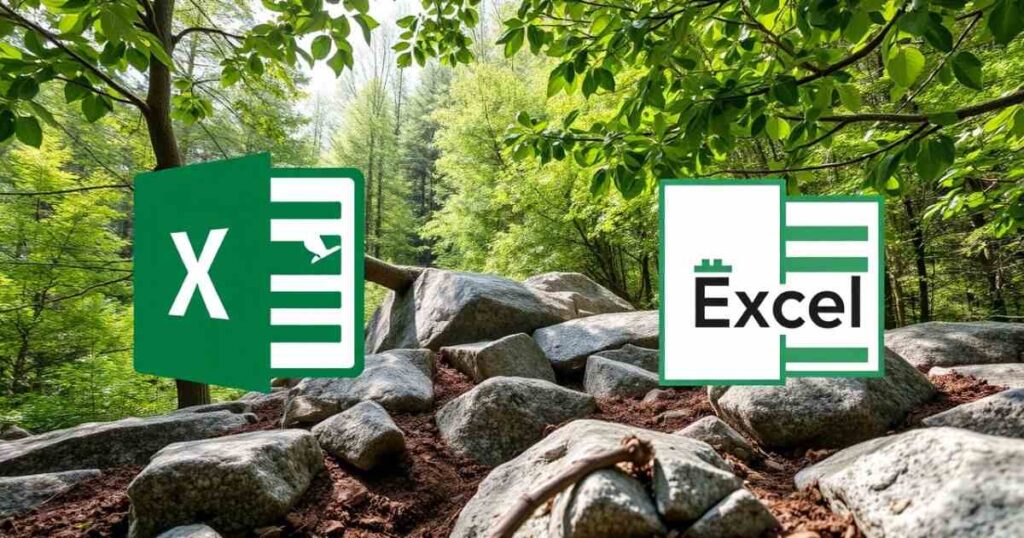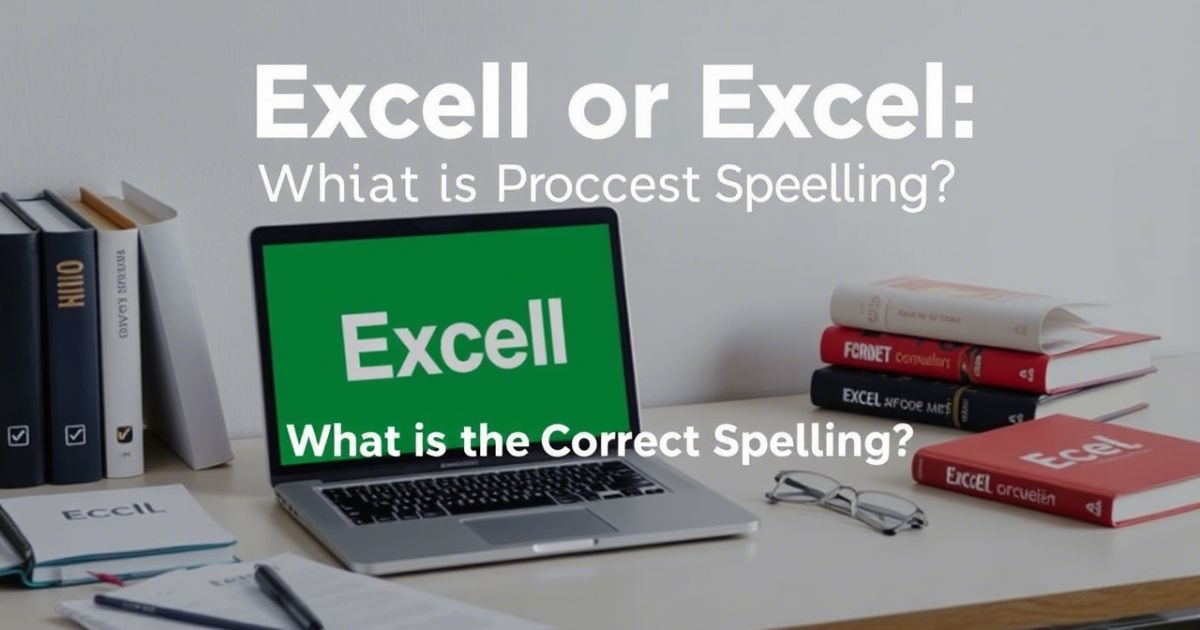Confused between Excell or Excel? You’re not alone. They may look and sound alike, but only one is right, and it’s more important than you think. Whether you’re sending a professional email or opening that spreadsheet software, spelling matters. So, how to spell Excell? Quick answer: You don’t. The correct word is Excel, with just one “l”.
Still wondering about Excell or Excel? Think of Excel as your go-to tool for data, reports, and productivity. Excell, on the other hand, is just a common spelling error. It might seem like a tiny difference, but using the wrong one can look unprofessional. So next time you pause over Excell or Excel, don’t guess, go with the one that helps you shine: Excel.
What do “Excell” and “Excel” Mean?
“Excell” is a common misspelling of “Excel,” which refers to both excel vs excell in a particular field and a popular Microsoft program used for data management and analysis.
Excell:
“Excell” is a common misspelling or variation of the word “Excel,” and it doesn’t have a distinct meaning on its own.
Excel:
“Excel” is a verb meaning to perform exceptionally well or surpass expectations in a particular area, such as academics, sports, or work performance. It’s also a powerful software program by Microsoft used for organizing and analyzing data in spreadsheets.
Origins of the Word “Excel”
The word “Excel” originates from the Latin word excellere, meaning “to rise” or “to surpass.” It passed through Old French before making its way into English, where it evolved to signify excelling or performing at a high level in various fields. This rich linguistic history reflects its current use, emphasizing outstanding achievement and excellence.
What’s the Difference between “Excell” and “Excel”?

The primary difference between excel vs excell lies in their usage and meaning. “Excell” is often a typographical error or misspelling of “Excel,” and does not have any distinct definition. It may appear in casual writing but lacks a proper linguistic or formal use, which could lead to confusion.
On the other hand, “Excel” is a well-established verb in English, meaning to perform exceptionally well in a particular field. It also refers to the popular Microsoft program, Excel, used for creating spreadsheets, performing data analysis, and managing information. The correct term, “excell vs excel,” has a clear meaning, whereas “Excell” should be avoided in formal or professional writing.
| Factor | Excel (with one “l”) | Excell (with double “ll”) |
| Correct Spelling | The accurate and widely accepted spelling, used in both formal and informal contexts. | A frequent error, not a legitimate form of the word “Excel.” |
| Meaning as a Verb | Denotes achieving exceptional performance or surpassing others in a given field. | Not a recognized verb in the English language, with no official definition. |
| Association with Software | Refers to Microsoft Excel, a highly-used program for creating spreadsheets, conducting data analysis, and organizing information. | Not related to any known software or program. |
| How It’s Used | Used to describe both outstanding achievement and the popular Microsoft application. | Often seen as a typo or incorrect usage of the word “Excel.” |
| Standard Recognition | Widely recognized and used correctly in academic, business, and casual settings. | Not accepted in standard English and can be mistaken for an error. |
| Risk of Confusion | Unlikely to cause confusion when used correctly, as it’s well-understood. | May lead to confusion or errors due to incorrect spelling. |
Tenses of the Verb ‘Excel’ with Examples
| Tense | Auxiliary Verb | Main Verb | Example Sentences |
| Present Simple | – | excel | • He excels in mathematics.• She excels in athletics. |
| Present Continuous | am/are/is | excelling | • They are excelling in their academic work.• I am excelling in my professional life at the moment. |
| Present Perfect | have/has | excelled | • She has excelled in every event she participated in.• They have excelled in all their endeavors this year. |
| Present Perfect Continuous | have/has been | excelling | • He has been excelling in his job for several years.• We have been excelling in collaborative projects lately. |
| Past Simple | – | excelled | • She excelled in the competition last season.• He excelled in every game last year. |
| Past Continuous | was/were | excelling | • They were excelling in their performance during the show.• I was excelling at the task until an issue arose. |
| Past Perfect | had | excelled | • She had excelled in all her subjects by the time she graduated.• He had excelled in his role before moving on. |
| Past Perfect Continuous | had been | excelling | • They had been excelling in their positions until the merger.• She had been excelling in her field for years before the change. |
| Future Simple | will | excel | • He will excel in his career once he gains more experience.• They will excel when the project is completed. |
| Future Continuous | will be | excelling | • She will be excelling in her new position next year.• They will be excelling by the time they finish the course. |
Why Did We Add an Extra ‘l’ in ‘Excelled’ and ‘Excelling’?

The addition of an extra “l” in words like “excelled” and “excelling” is rooted in English spelling rules. In English, when a one-syllable verb ends in a single consonant preceded by a single vowel (like “excel”), we double the final consonant when adding suffixes that begin with a vowel, such as “-ed” or “-ing.” This helps maintain the word’s pronunciation by preserving the short vowel sound. Therefore, “excel” becomes “excelled” or “excelling” to keep the stress on the first syllable.
This rule, derived from older English conventions and patterns, ensures consistency in the language’s phonetic structure. The “l” doubling is particularly important for words where the vowel sound before the consonant is short.
Without doubling the consonant, the pronunciation could shift, altering the intended meaning or rhythm of the word. This principle applies to many English verbs, helping to maintain both clarity and consistency in spoken and written forms.
Examples in Context
See how different forms of “excel” are used naturally across real-life situations and sentence structures.
Excell (with double ‘ll’)
We won’t include “Excell” with double ‘l’ in the examples since it’s an incorrect spelling and not accepted in standard English usage.
Related Guide:
Cart vs Kart: Which Spelling to Use?
Excel (with one “l”)
A powerful spreadsheet software used for data analysis, calculations, and visualization.
As a Verb
- She excels at playing the piano and frequently performs at local concerts.
- John excels at coding and has developed several successful apps.
- Sarah excels in writing and has published multiple novels.
- Mark excels in public speaking and often delivers keynote addresses at conferences.
- Lisa excels in mathematics and regularly wins regional math competitions.
- David excels at sports and has earned multiple championships in tennis.
- Emma excels in photography and has showcased her work in several galleries.
- James excels at cooking and owns a five-star-rated restaurant.
- Olivia excels in graphic design and creates stunning visuals for major brands.
- Jack excels at problem-solving and always finds creative solutions at work.
- Mia excels in teaching and inspires her students to reach their full potential.
- Noah excels at teamwork and is always the go-to person for collaboration.
- Lily excels in fashion and has her own clothing line that’s gaining popularity.
- Benjamin excels in entrepreneurship and successfully launched a tech startup.
- Ava excels in acting and has starred in several critically acclaimed films.
As the Software Program
- She uses Excel to organize large data sets and streamline her workflow.
- John relies on Excel to create complex financial models and reports.
- Sarah frequently utilizes Excel to track project timelines and milestones.
- Mark uses Excel to automate repetitive tasks and save time at work.
- Lisa employs Excel to analyze sales data and generate insightful reports.
- David leverages Excel to manage inventory and keep track of stock levels.
- Emma uses Excel to create dynamic dashboards for monitoring business performance.
- James uses Excel’s pivot tables to summarize large amounts of data quickly.
- Olivia relies on Excel for data visualization, creating charts and graphs to present trends.
- Jack uses Excel to build custom templates for budgeting and financial planning.
- Mia uses Excel to track customer feedback and evaluate satisfaction scores.
- Noah utilizes Excel for organizing research data and performing statistical analysis.
- Lily relies on Excel’s advanced formulas to calculate ROI for her marketing campaigns.
- Benjamin uses Excel to consolidate data from multiple sources into one comprehensive report.
- Ava employs Excel’s collaboration features to work on shared documents with her team.
Synonyms of Excell (with double ‘ll’)

Excell with double “l” is not a standard English word, so it has no official synonyms. It’s often a misspelling of Excel.If used as a name or brand, its meaning and synonyms depend on the context.
Synonyms of Excel (with one “l”)
- Surpass
- Outperform
- Outshine
- Outdo
- Exceed
- Transcend
- Thrive
- Shine
- Beat
- Best
FAQ’s
Is it Excell or Excel?
It is Excel, not Excell. Many people confuse the spelling, but Excel is the correct form when talking about performance or software.
What is the meaning of I excel?
I excel means I do something very well or better than others. In the phrase Excell or Excel, Excel is the correct word to use.
Does excel correct spelling?
Yes, Excel is the correct spelling between Excell or Excel with one “l”. The word Excell is often used by mistake, but it is not standard.
Does excel mean excellent?
Excel means to do very well, while excellent means something is really good. They are related but not the same. Don’t mix up Excell or Excel.
Is it Excel or excell in English?
In English, the right word is Excel with one “l”. Excell or Excel may look similar, but only Excel is correct.
Conclusion
The debate of Excell or Excel is often confusing, but it’s important to remember that the correct spelling is Excel with one “l”. Many people mistakenly use Excell, but this is not the proper spelling. Whether you’re deciding between Excell or Excel or wondering how to spell excell, it’s always best to go with Excel.
When comparing Excell or Excel, the answer is clear, Excel is the correct and widely accepted version. So, next time you’re writing, keep in mind that Excel is the right way to spell it. Whether you’re working with data or just using the software, always use Excel instead of Excell. Understanding Excel or Excell will help you avoid spelling mistakes and improve your writing.

Ember Rose is a dedicated administrator with 4 years of experience in efficient operations management and team leadership. Skilled in streamlining workflows and enhancing productivity.

